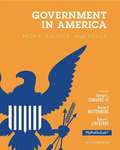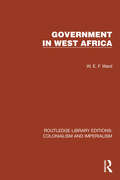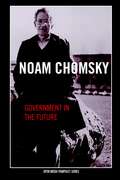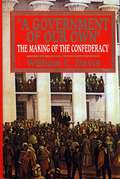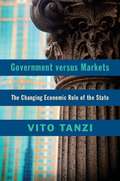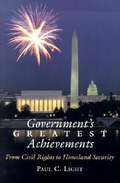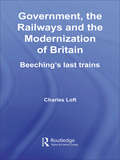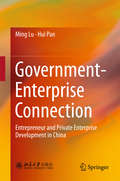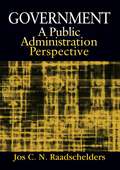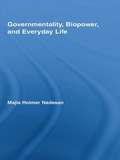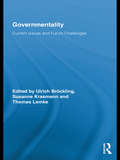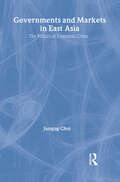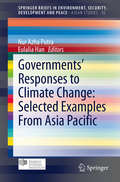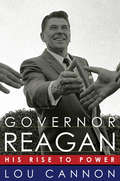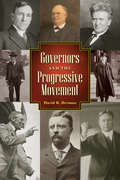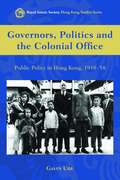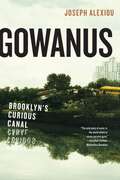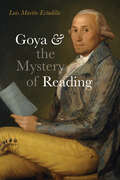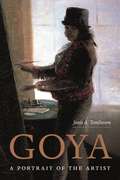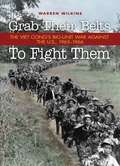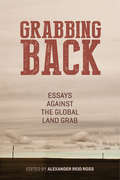- Table View
- List View
Government in America: People, Politics, and Policy, 2012 Election Edition (Sixteenth Edition)
by Martin P. Wattenberg Robert L. Lineberry George C. EdwardsGovernment in America, 2012 Election Edition looks at government's impact on the daily lives of Americans with a public policy approach. This text introduces the main features of American politics and helps students see that politics drives what government can-or cannot do-for the people. This text features full integration with the New MyPoliSciLab. MyPoliSciLab includes a wide array of resources to encourage students to look at American politics like a political scientist.
Government in West Africa (Routledge Library Editions: Colonialism and Imperialism #29)
by W.E.F. WardGovernment in West Africa (1968) examines the practical working of modern government and the constitutional history of West Africa. It looks at various political thinkers and their application to the issues of civil government in West Africa; modern constitutional struggles on the continent; and problems associated with different political systems in the region.
Government in the Future (Open Media Series)
by Noam ChomskyIn this classic talk delivered at the Poetry Center, New York, on February 16, 1970, Noam Chomsky articulates a clear, uncompromising vision of social change. Chomsky contrasts the classical liberal, libertarian socialist, state socialist, and state capitalist world views and then defends a libertarian socialist vision as "the proper and natural extension . . . of classical liberalism into the era of advanced industrial society."In his stirring conclusion Chomsky argues, "We have today the technical and material resources to meet man's animal needs.We have not developed the cultural and moral resources or the democratic forms of social organization that make possible the humane and rational use of our material wealth and power.Conceivably, the classical liberal ideals as expressed and developed in their libertarian socialist form are achievable. But if so, only by a popular revolutionary movement, rooted in wide strata of the population and committed to the elimination of repressive and authoritarian institutions, state and private. To create such a movement is a challenge we face and must meet if there is to be an escape from contemporary barbarism."
Government of Our Own
by William C. DavisFor four crucial months in 1861, delegates from all over the South met in Montgomery, Alabama, to establish a new nation. Davis (Jefferson Davis: The Man and the Hour, LJ 11/15/91) tells their story in this new work, another example of Davis's fine storytelling skill and an indispensable guide to understanding the formation of the Confederate government. Among the issues Davis examines are revising the Constitution to meet Southern needs, banning the importation of slaves, and determining whether the convention could be considered a congress. Also revealed are the many participating personalities, their ambitions and egos, politicking and lobbying for the presidency of the new nation, and the nature of the city of Montgomery itself.
Government versus Markets: A Contemporary and Historical Perspective
by Vito TanziVito Tanzi offers a truly comprehensive treatment of the economic role of the state in the twentieth and twenty-first centuries from a historical and world perspective. The book addresses the fundamental question of what governments should do, or have attempted to do, in economic activities in past and recent periods. It also speculates on what they are likely or may be forced to do in future years. The investigation assembles a large set of statistical information that should prove useful to policy-makers and scholars in the perennial discussion of government's optimal economic roles. It will become an essential reference work on the analytical borders between the market and the state, and on what a reasonable 'exit strategy' from the current fiscal crises should be.
Government's Greatest Achievements: From Civil Rights to Homeland Defense
by Paul C. LightIn an era of promises to create smaller, more limited government, Americans often forget that the federal government has amassed an extraordinary record of successes over the past half century. Despite seemingly insurmountable odds, it helped rebuild Europe after World War II, conquered polio and other life-threatening diseases, faced down communism, attacked racial discrimination, reduced poverty among the elderly, and put men on the moon. In Government’s Greatest Achievements, Paul C. Light explores the federal government’s most successful accomplishments over the previous five decades and anticipates the most significant challenges of the next half century. While some successes have come through major legislation such as the 1965 Medicare Act, or large-scale efforts like the Apollo space program, most have been achieved through collections of smaller, often unheralded statutes. Drawing on survey responses from 230 historians and 220 political scientists at colleges and universities nationwide, Light ranks and summarizes the fifty greatest government achievements from 1944 to 1999. The achievements were ranked based on difficulty, importance, and degree of success. Through a series of twenty vignettes, he paints a vivid picture of the most intense government efforts to improve the quality of life both at home and abroad—from enhancing health care and workplace safety, to expanding home ownership, to improving education, to protecting endangered species, to strengthening the national defense. The book also examines how Americans perceive government’s greatest achievements, and reveals what they consider to be its most significant failures. America is now calling on the government to resolve another complex, difficult problem: the defeat of terrorism. Light concludes by discussing this enormous task, as well as government’s other greatest priorities for the next fifty years.
Government, the Railways and the Modernization of Britain: Beeching's Last Trains (British Politics and Society)
by Charles LoftMore than 40 years after its publication, the 1963 Beeching Report on British railways remains controversial for recommending the closure of a third of Britain’s railways. In this book, Charles Loft examines: why the nationalized railways were in such dire financial straits by 1963 how government work on future transport needs led to conclusions which would have cut Britain’s railways down by thousands of miles what difficulties eventually halted attempts by Conservative and Labour governments to implement these cuts. This book will be invaluable to anyone interested in how transport policy is made or how it has arrived at its current state and sheds fascinating new light on the working of government, the economy and the mood of the times under Churchill, Eden, Macmillan and Wilson.
Government-Enterprise Connection
by Ming Lu Hui PanThis book is an empirical study on the relationship between private enterprises, entrepreneurs and the government in P. R. China. The two authors conducted a detailed survey of enterprises and entrepreneurs in Liuzhou, Guangxi Zhuang Autonomous Region, China. Although it was only conducted in a medium sized city, the survey provides a rare source of information on matched entrepreneur-enterprise pairs. It provides detailed information on management, performance, enterprise-government relationship, as well as entrepreneurs' personal information and measurements of various psychological parameters. With this first-hand information, the authors analyzed several interesting issues concerning enterprise-entrepreneur-government relationships. Readers will gain an understanding of the following topics: Why and how does China have such special enterprise-entrepreneur-government relationships? Do enterprises' political connections in the form of entrepreneurs' political status help improve the performances of these enterprises? Which of the surveyed entrepreneurs could become members of the People's Congress and the People's Political Consulting Conference? How do entrepreneurs feel when they are faced with greater government intervention? How will China move ahead in the ongoing reform and development in the light of the enterprise-entrepreneur-government relationship? This book examines the way in which China's enterprise-entrepreneur-government relationship helps enterprises develop in a transitional market. In the appendix to this book, one of the authors, Ming Lu, provides evidence, based on data from listed companies, that having political connections can help enterprises enter the markets of provinces other than their place of registration. However, this political connection also distorts the market by giving the entrepreneurs more opportunities to develop their business. At the same time, those entrepren eurs who face interventions from the government also shoulder greater costs in the form of loss of psychological happiness. The inference of this book is that at some point in the foreseeable future, China will gradually build its market system and integrate its domestic markets, so that private enterprises will no longer rely so heavily on their political connections.
Government: A Public Administration Perspective
by Jos C. RaadscheldersMost public administration texts overly compartmentalize the subject and don't interconnect the various specializations within government, which leaves a serious gap in preparing students for public service. Government: A Public Administration Perspective is designed to fill that void. It provides a comprehensive, multidisciplinary view of government that includes perspectives from political science, political theory, international relations, organizational sociology, economics, and history. The text draws on classic and modern literature from all these areas to analyze government at four different levels - ideational, societal, organizational, and individual layers. It links public administration's various subfields - human resource management, budgeting, policy making, organizational theory, etc. - into a holistic framework for the study of government. It also includes an extensive bibliography drawing from American and European literature in support of the book's global, historical, and comparative approach.
Governmentality, Biopower, and Everyday Life (Routledge Studies in Social and Political Thought #Vol. 57)
by Majia Holmer NadesanGovernmentality, Biopower, and Everyday Life synthesizes and extends the disparate strands of scholarship on Foucault's notions of governmentality and biopower and grounds them in familiar social contexts including the private realm, the market, and the state/military. Topics include public health, genomics, behavioral genetics, neoliberal market logics and technologies, philanthropy, and the war on terror. This book is designed for readers interested in a rigorous, comprehensive introduction to the wide array of interdisciplinary work focusing on Foucault, biopower and governmentality. However, Nadesan does not merely reproduce existing literatures but also responds to implicit critiques made by Cultural Studies and Marxist scholarship concerning identity politics, political economy, and sovereign force and disciplinary control. Using concrete examples and detailed illustrations throughout, this book extends the extant literature on governmentality and biopower and helps shape our understanding of everyday life under neoliberalism.
Governmentality: Current Issues and Future Challenges (Routledge Studies in Social and Political Thought)
by Ulrich BröcklingExamining questions of statehood, biopolitics, sovereignty, neoliberal reason and the economy, Governmentality explores the advantages and limitations of adopting Michel Foucault's concept of governmentality as an analytical framework. Contributors highlight the differences as well as possible convergences with alternative theoretical frameworks. By assembling authors with a wide range of different disciplinary backgrounds, from philosophy, literature, political science, sociology to medical anthropology, the book offers a fresh perspective on studies of governmentality.
Governments and Markets in East Asia: The Politics of Economic Crises (Routledge Malaysian Studies Series #Vol. 3)
by Jungug ChoiGovernments and Markets in East Asia examines the relationship between economic performance, elite co-operation, and political regime stability in the context of the Asian crisis, and argues that economic crisis is not the cause of greater political harmony or discord, but rather that it serves as a catalyst that may encourage elites to cooperate or conflict depending upon the particular circumstances at the time of crisis. This book maintains that the political consequences of the Asian crisis varied according to the type of elite that existed in each stricken society. Including a comprehensive comparative study of five countries' experiences during the economic crisis: Indonesia, Thailand, Malaysia, South Korea and the Philippines, this book investigates the pre-crisis political context and elite configuration of these five countries, and considers what lessons can be drawn from their experiences. Constituting an impressive body of descriptive and theoretical material on the Asian crisis, this book looks towards the implications of economic crisis for elite behaviour and political stability.
Governments' Responses to Climate Change: Selected Examples From Asia Pacific
by Nur Azha Putra Eulalia HanThis multidisciplinary volume articulates the current and potential public policy discourse between energy security and climate change in the Asia-Pacific region, and the efforts taken to address global warming. This volume is unique as it analyses two important issues climate change and energy security through the lens of geopolitics at the intersection of energy security. It elaborates on the current and potential steps taken by state and non-state actors, as well as the policy innovations and diplomatic efforts (bilateral and multilateral, including regional) that states are pursuing. This Brief stems from the assumption that its audience is aware of the consequences of climate change, and will therefore, only look at the issues identified. It provides a useful read and reference for a wide-range of scholars, policymakers, researchers and post-graduate students.
Governor Reagan His Rise To Power: His Rise To Power
by Lou CannonBased his work on interviews and access to previously unpublished material, the author of several books on Reagan casts his political career from its start in 1960s California to the successful 1980 presidential bid in terms of such roles as pragmatist, survivor, and salesman. Includes photos. Annotation (c)2003 Book News, Inc. , Portland, OR (booknews. com)
Governors and the Progressive Movement
by David R. BermanGovernors and the Progressive Movement is the first comprehensive overview of the Progressive movement’s unfolding at the state level, covering every state in existence at the time through the words and actions of state governors. It explores the personalities, ideas, and activities of this period’s governors, including lesser-known but important ones who deserve far more attention than they have previously been given. During this time of greedy corporations, political bosses, corrupt legislators, and conflict along racial, class, labor/management, urban/rural, and state/local lines, debates raged over the role of government and issues involving corporate power, racism, voting rights, and gender equality—issues that still characterize American politics. Author David R. Berman describes the different roles each governor played in the unfolding of reform around these concerns in their states. He details their diverse leadership qualities, governing styles, and accomplishments, as well as the sharp regional differences in their outlooks and performance, and finds that while they were often disposed toward reform, governors held differing views on issues—and how to resolve them. Governors and the Progressive Movement examines a time of major changes in US history using relatively rare and unexplored collections of letters, newspaper articles, and government records written by and for minority group members, labor activists, and those on both the far right and far left. By analyzing the governors of the era, Berman presents an interesting perspective on the birth and implementation of controversial reforms that have acted as cornerstones for many current political issues. This book will be of interest to students and scholars of US history, political science, public policy, and administration.
Governors, Politics and the Colonial Office
by Gavin UreThis book explores the making of public policy for Hong Kong between 1918 and 1958. During much of this period, the Hong Kong government had limited policy-making capabilities. Many new policies followed initiatives either from the Colonial Office or from politicians in Hong Kong. This book examines the balance of political power influencing how such decisions were reached and who wielded the most influence - the Hong Kong or British governments or the politicians. Gradually, the Hong Kong government, through implementing new policies, improved its own policy-making capabilities and gained the ability to exercise greater autonomy.
Gowanus: Brooklyn’s Curious Canal
by Joseph AlexiouThe surprising history of the Gowanus Canal and its role in the building of BrooklynFor more than 150 years, Brooklyn’s Gowanus Canal has been called a cesspool, an industrial dumping ground, and a blemish on the face of the populous borough—as well as one of the most important waterways in the history of New York harbor. Yet its true origins, man-made character, and importance to the city have been largely forgotten. Now, New York writer and guide Joseph Alexiou explores how the Gowanus creek—a naturally-occurring tidal estuary that served as a conduit for transport and industry during the colonial era—came to play an outsized role in the story of America’s greatest city. From the earliest Dutch settlers of New Amsterdam, to nearby Revolutionary War skirmishes, or the opulence of the Gilded Age mansions that sprung up in its wake, historical changes to the Canal and the neighborhood that surround it have functioned as a microcosm of the story of Brooklyn’s rapid nineteenth-century growth. Highlighting the biographies of nineteenth-century real estate moguls like Daniel Richards and Edwin C. Litchfield, Alexiou recalls the forgotten movers and shakers that laid the foundation of modern-day Brooklyn. As he details, the pollution, crime, and industry associated with the Gowanus stretch back far earlier than the twentieth century, and helped define the culture and unique character of this celebrated borough. The story of the Gowanus, like Brooklyn itself, is a tale of ambition and neglect, bursts of creative energy, and an inimitable character that has captured the imaginations of city-lovers around the world.
Goya and the Mystery of Reading
by Luis Martín-EstudilloSpanish artist Francisco de Goya (1746–1828) lived through an era of profound societal change. One of the transformations that he engaged passionately was the unprecedented growth both in the number of readers and in the quantity and diversity of texts available. He documented and questioned this reading revolution in some of his most captivating paintings, prints, and drawings.Goya and the Mystery of Reading explores the critical impact this transition had on the work of an artist who aimed not to copy the world around him, but to see it anew—to read it. Goya's creations offer a sustained reflection on the implications of reading, which he depicted as an ambiguous, often mysterious activity: one which could lead to knowledge or ecstasy, to self-fulfillment or self-destruction, to piety or perdition. At the same time, he used reading to elicit new possibilities of interpretation. This book reveals for the first time the historical, intellectual, and artistic underpinnings of reading as one of the pillars of his art.
Goya's Glass
by Monika ZgustovaRichly imagined portraits celebrating three historical women—including Goya&’s muse—by an &“outstanding writer&” (Vaclav Havel). In &“a unique voice that owes as much to Kundera as to Flaubert, to Hasek as to Tolstoy,&” Czech writer Monika Zgustova brings to life the stories of three remarkable women in different countries and eras who defied the social restrictions of their day to find freedom of creative and personal expression (Juan Goytisolo, author of Exiled from Almost Everywhere). On her deathbed in the royal court of eighteenth-century Madrid, the Duchess of Alba, lover and portrait subject of Spanish painter Francisco Goya, recalls the passions of her youth. Living in the Austro-Hungarian Empire in the nineteenth century, Bozena Nemcova defies the protocols of her arranged marriage and pursues love and the life of a published writer—until her readers condemn her as a danger to society. In 1922, writer Nina Berberova escapes persecution during the Russian Revolution and flees to Paris with poet Vladislav Khodasevich, where the intelligentsia naively covet the promise of the Soviet Union. Each woman attempts to pursue a life of passion, intimacy, and creativity in worlds that rarely accommodate female desire and ambition. In praising Goya&’s Glass, Vaclav Havel said: &“Monika Zgustova&’s concerns are close to my own: the fate of the individual in the hands of totalitarianism. She is an outstanding writer whose fiction invokes the politics and culture of people throughout history.&”
Goya: A Portrait of the Artist
by Janis TomlinsonThe first major English-language biography of Francisco Goya y Lucientes, who ushered in the modern eraThe life of Francisco Goya (1746–1828) coincided with an age of transformation in Spanish history that brought upheavals in the country's politics and at the court which Goya served, changes in society, the devastation of the Iberian Peninsula in the war against Napoleon, and an ensuing period of political instability. In this revelatory biography, Janis Tomlinson draws on a wide range of documents—including letters, court papers, and a sketchbook used by Goya in the early years of his career—to provide a nuanced portrait of a complex and multifaceted painter and printmaker, whose art is synonymous with compelling images of the people, events, and social revolution that defined his life and era.Tomlinson challenges the popular image of the artist as an isolated figure obsessed with darkness and death, showing how Goya's likeability and ambition contributed to his success at court, and offering new perspectives on his youth, rich family life, extensive travels, and lifelong friendships. She explores the full breadth of his imagery—from scenes inspired by life in Madrid to visions of worlds without reason, from royal portraits to the atrocities of war. She sheds light on the artist's personal trials, including the deaths of six children and the onset of deafness in middle age, but also reconsiders the conventional interpretation of Goya's late years as a period of disillusion, viewing them instead as years of liberated artistic invention, most famously in the murals on the walls of his country house, popularly known as the "black" paintings.A monumental achievement, Goya: A Portrait of the Artist is the definitive biography of an artist whose faith in his art and his genius inspired paintings, drawings, prints, and frescoes that continue to captivate, challenge, and surprise us two centuries later.
Grab Their Belts to Fight Them
by Warren K. WilkinsIn 1965, despite pronounced disadvantages in firepower and mobility, the Communist Vietnamese endeavored to crush South Vietnam and expel the American military with a strategy for a quick and decisive victory predicated not on guerrilla but big-unit war. Warren Wilkins chronicles the formation, development, and participation of the Viet Cong in the opening phase of the big-unit war and shows how the failure of that strategy profoundly influenced the decision to launch the Tet Offensive. Unlike most books on the war, this one provides an authentic account from the Communist perspective, with the author drawing on memoirs, unit histories, and battlefield studies to reconstruct the formation and deployment of major military units, battles and campaigns, and the strategic debates that informed the big unit war.Published in cooperation with the Association of the United States Army
Grab a Handsome Guy as Strategist: Volume 4 (Volume 4 #4)
by Hu HuMu Yizi felt that there was no one whose life was more reversed than her own. She was clearly a bandit who enjoyed robbing rich and poor men. How could she have known that the empress would take a fancy to her and make her a general? He casually picked up a small brother and thought that he was a pretty boy, but he turned out to be a powerful master? The general was doing well, and now he was going to be an empress? War spread throughout the territories of the eight kingdoms, fighting among the powerful and influential officials of the imperial court. A long spear and a folding fan. "Together, he and she wrote the heroic legend of the Golden Age Capital." "General, the Imperial Advisor has snuck into the palace again!" Don't call me General, call me Queen! "—" Handsome, I can see that you're very talented. Why don't you become my advisor? "Girl, since your mind is so simple, why don't you wait for me on the bed?"
Grab a Handsome Guy as Strategist: Volume 5 (Volume 5 #5)
by Hu HuMu Yizi felt that there was no one whose life was more reversed than her own. She was clearly a bandit who enjoyed robbing rich and poor men. How could she have known that the empress would take a fancy to her and make her a general? He casually picked up a small brother and thought that he was a pretty boy, but he turned out to be a powerful master? The general was doing well, and now he was going to be an empress? War spread throughout the territories of the eight kingdoms, fighting among the powerful and influential officials of the imperial court. A long spear and a folding fan. "Together, he and she wrote the heroic legend of the Golden Age Capital." "General, the Imperial Advisor has snuck into the palace again!" Don't call me General, call me Queen! "—" Handsome, I can see that you're very talented. Why don't you become my advisor? "Girl, since your mind is so simple, why don't you wait for me on the bed?"
Grabbing Back
by Noam Chomsky Vandana Shiva Alexander Reid Ross"Land grabs are a global phenomenon of our times, driven by the ever increasing demands of both global corporations and the governments with which they are allied. But as this powerful and timely book demonstrates, ordinary citizens, small farmers and ordinary citizens around the world are standing up to defend their own with passion and ingenuity, and they are recording successes that are both extraordinary and inspiring." -Oliver Tickell, Editor, The Ecologist.Climate change ravages the earth, while wealthy elites try to grab as much of the world's diminishing resources as possible. As Vandana Shiva writes, land is life. But land, and the struggle to possess it, is also power-colonial and corporate power, to be sure, but also the power of the dispossessed to rise up and call for an end to the global land grab.Grabbing Back maps this struggle, bringing together analyses that uncover the politics of cultivation and control. In this unprecedented collection, on-the-ground activists join forces with critically acclaimed scholars to document the commodification and consumption of space, from foreclosed homes to annihilated rainforests, from ecotourism in Sri Lanka to the tar sands of Montana, and to outline the strategies and tactics that might the destruction.With contributions by Vandana Shiva, Noam Chomsky, Max Rameau, Grace Lee Boggs, Michael Hardt, Ahjamu Umi, Ben Dangl, and many others.More Praise for Grabbing Back:"Part of the reason that knowledge about the current global land grab is so uncertain is the paucity of perspectives and analysis in defining the problem. This book fills the gap admirably." -Raj Patel, author of Stuffed and Starved"The acquisition, control, and exploitation of land, as well as the simultaneous dispossession of land-based and peasant communities, is central to the processes of both colonialism and capitalism. As Fanon reminds us, egalitarian governance and stewardship of land is fundamental to the struggle for liberation and self-determination for all oppressed peoples. This makes Grabbing Back a necessary study for anticapitalist and anticolonial movements." -Harsha Walia, author of Undoing Border Imperialism"Grab back this sparkling mosaic of essays as a treasure of our new-old knowledge commons. Together these pieces replace dichotomies with dialectics, making explicit the inseparability of land and collective life. Together they restore the vital concept of social ecology in resistance to relentless and increasingly apocalyptic capitalism, with emphasis on its second contradiction: its impossibility on a finite resource base." -Maia Ramnath, author of Decolonizing Anarchism"As the forces of thanatos leave no stone unturned in their quest to dominate the entire planet, this anthology provides a much needed antidote. Weaving together accounts from around the world, the authors advocate building grassroots movements aimed at subverting capital's incessant assault on our lives and land."-George Katsiaficas, author of Asia's Unknown Uprisings"Never perhaps has the land question been so crucial for anti-capitalist movements, as we are witnessing a global process of enclosure that privatizes lands, waters, forests, displacing millions from their homes, and placing monetary gates to what we rightly considered our commonwealth. It is essential then that we understand what motivates this drive and its effects in all their social and spatial dimensions. Grabbing Back takes us through this process, identifying the "reasons" and actors behind this global land-grab and, most important, introducing us to the struggles that people are making across the world to resist being evicted from their lands and to reclaim the earth. " -George Caffentzis, Committee for Academic Freedom in Africa
Grace
by Robert WardWhen his parents' bitter arguments threaten to tear the family apart, young Robert Ward seeks sanctuary with his compassionate grandmother, Grace. But Robert soon learns that his grandmother, a social activist, intellectual, and church woman, harbors deep troubles of her own. Terrifying "spells" in the middle of the night threaten her sanity, and she seems to be abandoning the causes of social justice that have long made her a pillar of the community. Worried that his family is starting to disintegrate, Robert sets out to find the source of his grandmother's pain. Little by little he uncovers the secret that forever changed Grace's life - her friendship with, and betrayal of, a black man named Wingate Washington. And Robert also comes to understand Grace's undying love for his grandfather, Robert "Cap" Ward, a freighter captain, a union activist, an alcoholic - and a surprisingly complex man.
